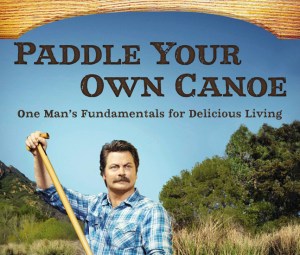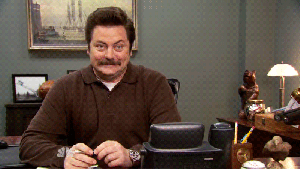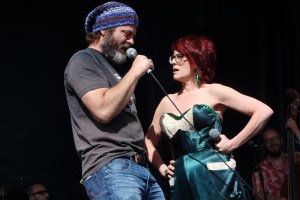There are many similarities between Nick Offerman and the ultra-libertarian character, Ron Swanson, he portrays on NBC’s “Parks and Recreation.” In interviews, Offerman is quick to point out that the legend of Ron Swanson can be attributed to the talented writing staff on the Thursday night program. Though if you have seen Offerman on late night talk shows, or read his new book “Paddle Your Own Canoe” you know that the similarities between Nick and Ron are fast and fluid. They both have a passion for wood-working, brunette women and a sense of honesty and respect that is so often missing from today’s society. The simplicities of life begin with the preface to PYOC. Whereas other first time authors may fill the first pages with a long and drawn out ode to life, freedom and prosperity (that will come later) Offerman begins with a Tom Waits quote, one that sets the humorous and straight forward tone for the 334 pages to come.
Videos by Rare
A gentleman is someone who can play the accordion, but doesn’t.- Tom Waits
The structure and content of the book closely follows Offerman’s recent one man stage show “American Ham.” Offerman believes there are several innate and firm aspects to living a fulfilling and healthy life. Throughout the stage show and the book, Offerman explains how he came to these realizations and the ease in which they can be applied to each day. In the book, Offerman is given the space to further extrapolate on these points, mixing in more personal anecdotes than one-liner jokes.

Chapter Four: Football Troubadour, Don’t Be an Asshole
For Offerman, not being an asshole is a simple task. Though he believes that people are intrinsically wired to be difficult, he believes that people are also “cognizant, curious beings, capable of philosophical thought.” True colors, of hate and annoyance, Offerman believes, are revealed in our inherent animalistic nature. We live in a jungle, and the people we come across, some lovers, some fighters, form the basis for the “asshole” nature we all share. This however is something that Offerman believes can be bypassed. By being aware of and ok with the “animal voice deep inside us all that we’ve learned to repress by socialization” Offerman believes that one can live a happy life.
By being aware of this quality of man, and choosing to turn the other cheek and not get bothered by the small things in life, Offerman by remaining calm can enjoy a deeper quality of life. He uses the drive time traffic in Los Angeles as an example of something that all loathe, and most allow to get the best of them. By logically identifying the source of this simple anger, and what needed to happen to bypass it, a smoother and happier path can be formed.
When I learned to ignore the business and instead focus on woodworking and my LOVE LIFE, I merely calculated my drive time, adding a fifteen-minute cushion for chilling out, and Christ almighty, did my mood improve.
Chapter 12: Subaru Leavings, Discern Your Ass from a Hole in the Ground
Keeping the pace with some of the ideologies presented in chapter 4 and throughout the book, Offerman spends much of chapter 12 toasting his parents. The idea of a G.P.S goes against much of Offerman’s personal philosophy. He fondly recalls the excitement that came along with driving to his families fishing cabin in Minnesota as a child. His father, Offerman notes, was very proud of his vast collection of maps, and each year would embark on a new driving route when descending upon the cabin. Reading a map, and relying on one’s own nature to find their way is very important to Offerman.
To me this ability is akin to the tying of a knot, the building of a fire, or the changing of a tire. Maps are easily as valuable as any other tool, but in this day and age I’ve been very disturbed to see people neglect their maps and instead completely depend upon their G.P.S units.
This does not mean that Offerman is anti-cell phone or technology, much like his character Ron Swanson. Offerman understands the benefits of the phone, mentioning that he is more than happy to find out, when traveling, where the best brisket it and what the locals think of it. This type of access to information is ok, what stands out, is how one chooses to apply the information. By depending on technology for all of our needs, we as a society have become more “infantlike”. Such personal coddling denies our society the ability to think freely for themselves and learn from both their mistakes and triumphs.
Chapter 14: Romantic Love, Love Your Woman (A Paean to Megan)
Beyond having a sense of personal happiness and self-reliance, chief among the topics tackled in PYOC is what Offerman finds to be one of life’s most important triumphs;love. Many of these descriptions would be unfit for print, both on stage and off, Offerman routinely expresses a deep devotion and love for his wife, TV actress Megan Mulally. Their bond and willingness to put it on display has become the topic of interviews, essays and their pairing in several films and television episodes. Offerman believes that finding when you find someone you love, fulfilling that pairing becomes a paramount goal. By making a relationship a priority, one has a better chance of surviving the daily annoyances life can offer.
Engage in romantic love. It truly makes life worth living. Romance affords you the opportunity to do a lot of “giving” which I believe I have read is said to better than “receiving”.
“Paddle Your Own Canoe” is a uniquely honest and consistently hilarious look at how one man lives his life. Because that man has a funny mustache, and plays a variety of entertaining characters on TV and film becomes secondary to the wisdom and wit of Nick Offerman. Many books by actors are often written with a faux sincerity, more in line with a promotional ad than an actual text; Offerman has found a way to transcend that. Fans of Offerman may not be surprised by his candor, however this book is not specifically written for the fans. PYOC will be enjoyed by many, specifically those who have the capacity and the will to wonder, and to want more out of life, while maintaining a degree of simplicity and happiness; just like Nick Offerman.
No matter how you decide to spend a little more time on your gestures of giving, the point is just quite simply that you do.




